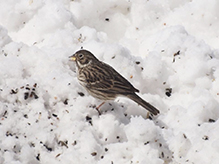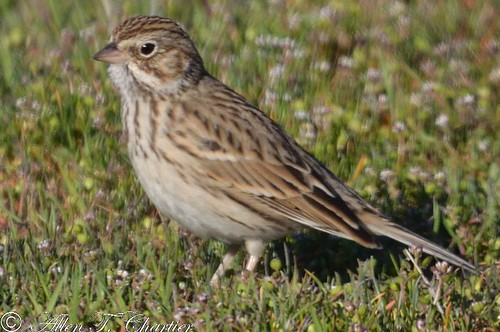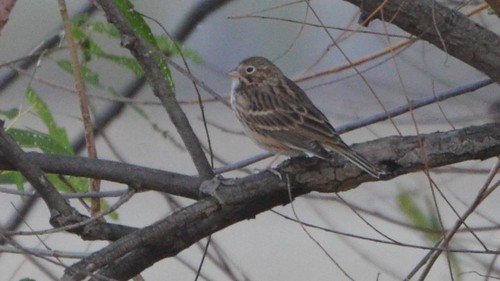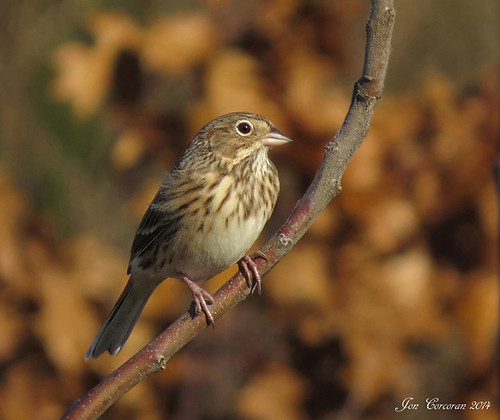Vesper Sparrow
(Pooecetes gramineus)
Conservation • Description • Habitat • Ecology • Distribution • Taxonomy
|
|
||||||||||||||
Description |
This sparrow has a small, chestnut-colored shoulder patch, streaked breast, white eye ring, and dark tail with white outer tail feathers visible in flight. |
Size |
6″in length 10″ wingspan |
Voice |
|
|
Two to four long notes of the same pitch followed by several slurred, shorter notes that are varied but lower in pitch than the long notes. |
Similar Species |
| Lark Sparrow (Chondestes grammacus) also has white outer tail feathers. The breast is unmarked except for a large dark spot in the center. |
Habitat |
Grassy areas with a shrubby border or scattered shrubs, and shrubby areas with grassy openings. |
Ecology |
Migration |
Late March to mid-October |
Nesting |
|
Food |
Grasshoppers, beetles, cutworms, and other invertebrates; and seeds |
Distribution |
Occurrence |
Common migrant and breeder |
Maps |
The Minnesota Ornithologists’ Union All Seasons Species Occurrence Map |
Taxonomy |
|
Class |
Aves (Birds) |
Order |
Passeriformes (Perching Birds) |
Family |
Passerellidae (New World sparrows) |
Genus |
Pooecetes (vesper sparrows) |
New World sparrows were traditionally combined with buntings into the family Emberizidae. Recent phylogenetic analysis (Barker et al. 2013) and mitochondrial DNA (mtDNA) analysis (Klicka et al. 2014) found that the Old World buntings should be separated as a sister to New World sparrows. New World sparrows have been separated into a new family, Passerellidae. |
|
Subordinate Taxa |
|
Eastern Vesper Sparrow (Pooecetes gramineus gramineus) Oregon Vesper Sparrow (Pooecetes gramineus affinis ) Western Vesper Sparrow (Pooecetes gramineus confinis) |
|
Synonyms |
|
|
|
Visitor Photos |
||
Share your photo of this bird. |
||
This button not working for you? |
||
Laurie Wachholz |
||
 |
|
|
MinnesotaSeasons.com Photos |
||
|
||
|
||

Slideshows |
Vesper Sparrow |

|
Vesper Sparrow |

|
Vesper Sparrow |

|

Visitor Videos |
||
Share your video of this bird. |
||
This button not working for you? |
||
|
Other Videos |
||
Vesper Sparrow |
About
Uploaded on Jul 26, 2011 Vesper Sparrow in Wyoming in July. ©JimZipp.com 2011 |
Vesper Sparrow |
About
Published on Aug 28, 2013 The Vesper Sparrow is fairly common throughout North America. It may be found in dry meadows, pastures, hay and grain fields, prairies, sagebrush, and along roadsides. It has a white eye ring and a dark ear patch. The streaked breast sometimes forms a central spot like the Song Sparrow's. It has a distinctive chestnut shoulder. In flight the white at the edge of short, slightly notched tail is conspicuous. The song may be heard as "here, here, where, where" followed by a downward trill; similar to Song Sparrow's with 2 longer slurred introductory notes. Also it has been described as "come, come, where, where, all together down the hill". |
Vesper Sparrow, Pooecetes gramineus |
About
Published on Jul 18, 2014 Vesper Sparrow, Pooecetes gramineus foraging. |
Prairie Life: Chestnut Shoulder... |
About
Published on Apr 26, 2014 A migrant Vesper Sparrow (Pooecetes gramineus) poses prettily, exhibiting most of the visible phenotypic features of its species. Photographed at Grand Forks, North Dakota (26 April 2014). |
Vesper Sparrow at Max Patch, NC |
About
Published on Jun 23, 2013 This vesper sparrow had precious few perching options on top of the Max Patch bald in North Carolina. Just my luck, he chose the trail marker only a few feet from me and sang his heart out! Editing note: There was some horrible wind noise on the source video from my Canon 7D that made it pretty hard to hear the bird song. I managed to use an audio equalizer in my video editor to mostly eliminate all of the low frequency wind noise (everything below 1700 Hz). The result is surprisingly clear! |

Visitor Sightings |
||
Report a sighting of this bird. |
||
This button not working for you? |
||
|
|
MinnesotaSeasons.com Sightings |
||

|
Created: Last Updated: © MinnesotaSeasons.com. All rights reserved. |